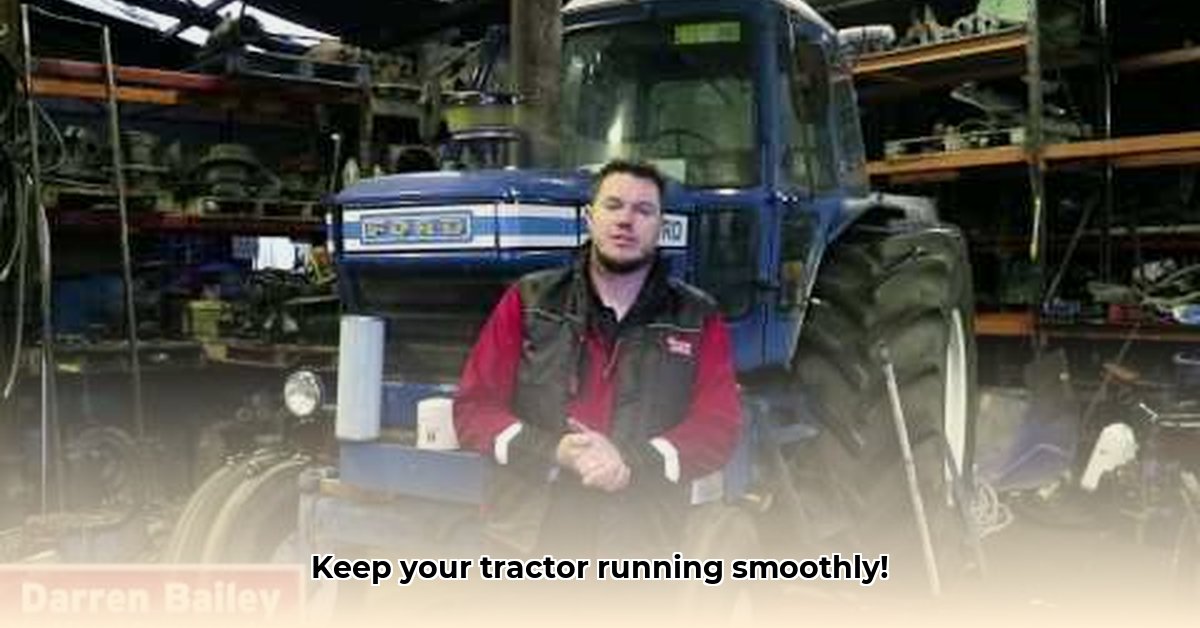
This comprehensive guide provides a beginner-friendly approach to tractor servicing, covering essential checks and maintenance tasks to keep your equipment running smoothly. Regular maintenance not only extends the life of your tractor but also prevents costly repairs and ensures optimal performance. Even if you're new to tractor maintenance, this step-by-step guide will equip you with the knowledge to perform basic servicing tasks confidently. For more specific tire maintenance, check out this guide on changing tractor tires.
Checking Your Tractor's Vital Fluids: A Critical First Step
Regularly checking your tractor's fluids is crucial for preventing major problems down the line. Think of it as a regular health checkup for your machine. Low fluid levels can significantly impact performance and potentially cause serious damage.
Engine Oil: (The lubricant that keeps your engine moving) Begin by locating the dipstick (a metal rod with a handle). Remove it, wipe it clean with a rag, reinsert it fully, then remove it again to check the oil level. The oil level should fall between the minimum and maximum marks on the dipstick. Low levels indicate the need for an oil change. Always consult your owner's manual for the correct type and amount of oil. Using the wrong engine oil can severely damage your engine.
Transmission Fluid: (Lubricates and cools the transmission gears.) Locate the transmission fluid dipstick (refer to your owner's manual) and check the fluid level. Low fluid may indicate a leak, requiring immediate attention.
Coolant: (Prevents your engine from overheating.) Inspect the coolant level in the radiator. Low coolant might point to a leak, needing prompt repair to avoid engine damage. Replenish with the correct coolant type as stated in your manual.
Hydraulic Fluid: (Powers various tractor functions.) Check the hydraulic fluid level and look for any leaks. Leaks can be costly to repair; address them as soon as possible. Refer to your owner's manual to locate the hydraulic fluid reservoir. Did you know that neglecting hydraulic fluid maintenance can lead to a 30% increase in repair costs?
Rhetorical Question: Why is checking your fluids so important, even if your tractor seems to be running fine? (Answer: Early detection prevents catastrophic failures and saves you money in the long run.)
Essential Maintenance Tasks: Keeping Your Tractor Running Smoothly
Beyond fluids, regular checks and maintenance on these components are crucial for optimal performance.
Air Filters: (Filter out dust and debris from the air entering the engine.) Clean or replace air filters as recommended in your owner's manual. Clogged air filters restrict airflow, reducing engine efficiency and power. Replacing them regularly can improve fuel efficiency by up to 5%.
Fuel Filters: (Filter out impurities from the fuel.) Check and clean or replace fuel filters regularly, as a clogged filter can prevent fuel from reaching the engine. Dirty fuel filters can cause significant performance issues and damage to the fuel system.
Battery Terminals: (Connect the battery to the electrical system.) Clean corrosion from battery terminals regularly with a wire brush and a baking soda solution to ensure optimal power flow. Corrosion can significantly reduce starting power.
Tires: (Provide traction and support the tractor's weight.) Check tire pressure weekly and adjust accordingly, as specified on the tire sidewall or your owner's manual. Proper tire inflation increases fuel efficiency and prevents uneven wear. Did you know that under-inflated tires can reduce fuel efficiency by up to 10%?
Quantifiable Fact: Regular maintenance can increase your tractor's lifespan by up to 25%.
Troubleshooting Common Tractor Problems: When to Seek Professional Help
While regular maintenance can prevent many problems, issues can still arise. Here are some common problems and when it's time for professional help:
Engine Won't Start: Check the battery, fuel levels, and ignition system. If the problem persists, it may require professional diagnosis and repair.
Unusual Noises: Clunking, grinding, or squealing sounds often indicate a problem that needs immediate attention to prevent bigger issues down the line.
Hydraulic Leaks: These are serious and require immediate professional attention to avoid significant damage and costly repairs. Ignoring a hydraulic leak can lead to a 70% increase in repair costs compared to prompt action.
Expert Quote: "Regular maintenance is the best way to prevent major breakdowns and costly repairs," says John Deere Mechanic, Mark Olsen, of Olsen's Tractor Repair. "Ignoring small problems leads to bigger, more expensive ones down the road."
Creating a Tractor Maintenance Schedule: A Proactive Approach
Regular servicing is an investment in the longevity and performance of your tractor. Developing a maintenance schedule is key:
| Task | Frequency | Notes |
|---|---|---|
| Oil Change | Every 50 hours | Or as recommended by the manufacturer |
| Air Filter Replacement | Every 25 hours | More often in dusty conditions |
| Fuel Filter Check/Change | Every 50 hours | Or as needed |
| Tire Pressure Check | Weekly | Crucial for fuel efficiency and traction |
| Coolant Level Check | Monthly | Prevents overheating and engine damage |
| Battery Terminal Check | Quarterly | Clean corrosion for optimal power delivery |
Human Element: Think of your tractor like a cherished pet. Regular care and attention will ensure a long and productive partnership.
Key Takeaways:
- Regular fluid checks are essential for preventing major problems.
- Consistent maintenance of key components (air filters, fuel filters, battery terminals, tires) is crucial.
- Knowing when to seek professional help can save you from costly repairs.
By faithfully following these steps, you can extend the life of your tractor, improve its performance, and significantly reduce the risk of unexpected breakdowns. Happy farming!